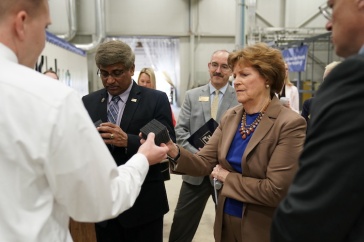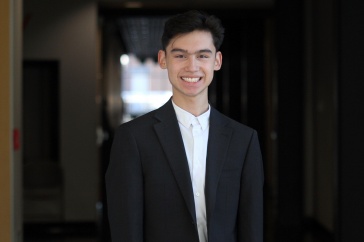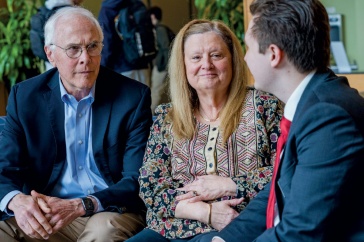|
|

Some of the team members who will compete for the Environmental Protection Agency’s P3 award in Washington, D.C. this weekend take a break from testing their scale model in the UNH Flow Physics Facility. Left to right: Professor Jean Benoît, Jonathan Travers ’12 (kneeling), graduate students Nate Dufresne and Pat Vincenti, Andrew Gherardi ‘12, and assistant professor Martin Wosnik.
A University of New Hampshire student project seeking to harvest the wind energy from bridge underpasses has been selected to compete for the Environmental Protection Agency’s (EPA) People, Prosperity and the Planet (P3) Award at its National Sustainable Design Expo April 21 – 23, 2012, in Washington, D.C.
Awarded $15,000 in phase one development funding, five undergraduates and one graduate student in both civil and mechanical engineering will travel to Washington to compete against more than 40 teams from universities nationwide for up to $90,000 in phase two funding.
With a local bridge as its model (the Bagdad Road bridge over Route 4 in Durham), the team is exploring the possibility of using wind patterns through bridge underpasses to harvest energy for powering structural health monitoring systems (SHMs), emergency warnings, signalization, and lighting. The project’s goal is to create a protocol for implementing wind turbines on existing and new underpass bridges.
Ultimately, the students anticipate that this project could help provide renewable clean energy to thousands of bridges, freeing them from the electrical grid and reducing the carbon footprint of the transportation infrastructure.
“The idea is the bridge of the future: self-powered, self-diagnosing, and maybe even self-healing,” says Erin Bell, associate professor of civil engineering and a faculty advisor on the project. Jean Benoît, professor of civil engineering, is the principal investigator for the project.

University of New Hampshire mechanical engineering students Andrew Gherardi ’12 (left), from Claremont, and Jonathan Travers ’12, from Atkinson, adjust the scale model of the Bagdad Road bridge in the UNH Flow Physics Facility, where they are exploring the possibility of harvesting wind energy from bridge underpasses.
Using the Bagdad Road bridge as a template to establish a selection procedure, the team built and tested a physical scale model of the bridge and surrounding terrain (including a simulated “forest” of 18,000 hand-glued wooden dowels) in UNH’s Flow Physics Facility, the largest wind tunnel of its type in the world. Mounting the model on a nine-foot-diameter turntable in the wind tunnel, the students gathered data on different angles of wind approach and different wind speeds. They compared this model data with field data from the bridge itself to identify and rank the most beneficial attributes for energy generation.
“We want to see where the best spots are to put a wind turbine under a bridge,” says Mike Naylor ’12, a civil engineering student from Hollis. “We’re also developing a selection process for bridges where wind turbines might be feasible.”
The students created a bridge selection tool that overlaid wind maps with New Hampshire Department of Transportation bridge maps to narrow down possible sites by eliminating those with undesirable wind speeds. “The faster the better,” says Andrew “A.J.” Gherardi ’12, a mechanical engineering student from Claremont, adding that “the wind speed of passing traffic is still a question mark.”
The project also took the students to Boston’s Museum of Science, where they collaborated with the museum’s wind exhibit staff to explore several different types of wind turbines that might be optimal for bridge underpasses.
Should the UNH group win the P3 award, they will receive $90,000 to proceed with the second phase of the project, which involves deploying a turbine on the Bagdad Road bridge and subjecting it to further testing. Following the P3 competition, the students will present this research at UNH’s Undergraduate Research Conference, one of the largest of its type in the country.
In addition to Naylor and Gherardi, students working on the project are senior civil engineering majors Joshua Steward (Nashua) and Leanne Schindler (Derry); senior mechanical engineering major Jonathan Travers (Atkinson); and graduate students Samuel White ’11 (Hudson). Mechanical engineering graduate students Pat Vincenti (New Hartford, Conn.), Nate Dufresne (Wells, Maine), and Caleb Morrill-Winter (Henniker) have provided invaluable help with the wind tunnel experiments.
Benoît and two other faculty advisors -- Tat Fu, assistant professor of civil engineering, and Martin Wosnik, assistant professor of mechanical engineering – will join the students in Washington. There, they will showcase their work on the National Mall during the three-day National Sustainable Design Expo.
“They’re doing real research,” Benoît says. “I’m proud of these guys. They’re really doing a great job.”
EPA’s P3 competition and the National Sustainable Design Expo
-
Written By:
Beth Potier | UNH Marketing | beth.potier@unh.edu | 2-1566





















































